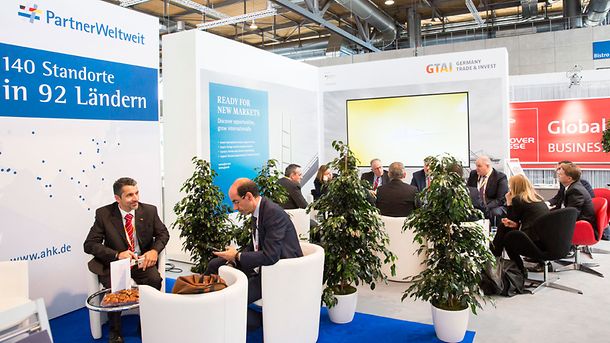Healthcare Expenditure 2023 (in EUR)
Your company is already operating in Germany and you would now like to export worldwide?
Key Facts
Germany’s healthcare market is the number one in Europe by market volume, number of patients, medical technology manufacturers, and healthcare providers. Germany’s growing healthcare markets are driven by various global trends. Social developments including demographic change and technological trends such as digitalization are key examples. By 2035, more than one quarter of the German population (27.4 percent) will be 65 years of age or older. In 2022, some 22.2 percent of the population belonged to this age group – already accounting for more than half of overall healthcare spending in Germany.
Because health insurance coverage is mandatory in Germany, almost two thirds of overall healthcare spending in Germany is covered by statutory and private health insurers.
Research and development conducted in Germany frequently leads to commercialization of cutting-edge technologies. This is particularly true in the life sciences sector which comprises a variety of high-tech sectors including molecular diagnostics, (bio-)pharmaceuticals and biomaterials as well as medical devices.
Industry Sectors
The Healthcare Industry Sectors are growing in Germany, in 2023 the Medical Technology Market by EUR 43 billion, Reimbursement of Digital Health Applications by EUR 75 million, Pharmaceutical Industry Turnover 59.8 billion, Biopharmaceutical Market by EUR 19.2 billion
Demographic Change
Demographic change and increasing age levels increase the individual probability of being affected by chronic diseases. Around 45 percent of the German population suffer from chronic and long-term diseases – accounting for about 80 percent of overall healthcare spending in Germany.
The number of people in need of care increased from 3.9 million in 2018 to 5.6 million in 2023, and may exceed 6 million by 2030.
New Materials
The development of new alloys and bio-based materials enable further enhancement of implants, pharmaceuticals, and medical devices.
Additive Manufacturing
Additive manufacturing and other novel production methods allow for higher efficiencies and quality.
Digitalization
The digitalization of health information and the secure exchange of data is leading to higher quality of medical care at lower cost.
Inpatient care in Germany
Around 1,900 hospitals with nearly 500,000 beds operate in Germany – not including rehabilitation or elderly care facilities. The overall number of medical hospitals is declining as smaller general hospitals close or merge with other hospitals to increase efficiency.
Innovation Clusters
Germany’s innovation clusters play a key role in healthcare market success. Every year companies participate in thousands of research projects with science and industry partners. Along the entire value chain – from R&D through scale-up and production to sales and marketing – Germany is renowned for its outstanding infrastructure.
News
Germany’s healthcare industry operates in a vibrant and dynamic business location where new opportunities arise on a daily basis. Find out more about what's going on in Germany’s healthcare markets.
Meet Us
Meet us at trade fairs and conferences worldwide or join our webinars. Schedule an appointment with our mobility experts. Find someone at the nearest global location to you or visit us in our Berlin headquarters. Our service is sponsored by the German government and therefore free of charge!
Downloads
Looking for detailed reports on industry segments and opportunities? Check out our range of free publications. Get more data, more analysis and more insights into Germany’s thriving healthcare markets.






